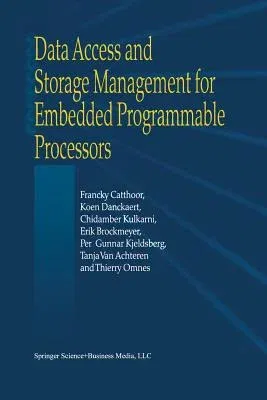Data Access and Storage Management for Embedded Programmable
Processors gives an overview of the state-of-the-art in system-level
data access and storage management for embedded programmable processors.
The targeted application domain covers complex embedded real-time
multi-media and communication applications. Many of these applications
are data-dominated in the sense that their cost related aspects, namely
power consumption and footprint are heavily influenced (if not
dominated) by the data access and storage aspects. The material is
mainly based on research at IMEC in this area in the period 1996-2001.
In order to deal with the stringent timing requirements and the data
dominated characteristics of this domain, we have adopted a target
architecture style that is compatible with modern embedded processors,
and we have developed a systematic step-wise methodology to make the
exploration and optimization of such applications feasible in a
source-to-source precompilation approach.
In a first part of the book, we introduce the context and motivation,
followed by a once-over-lightly view of the entire approach, illustrated
on a relevant driver from the targeted application domain. In part 2, we
show how source-to-source code transformations play a crucial role in
the solution of the earlier mentioned data transfer and storage
bottleneck in modern processor architectures for multi-media and
telecommunication applications. This is especially true for embedded
applications where cost issues like memory footprint and power
consumption are vital. It is also shown that many of these code
transformations can be defined in a platform-independent way. The
resulting optimized code behaves better on any of the modern platforms.
The steps include global data-flow and loop transformations, data reuse
decisions, high-level estimators and the link with parallelisation and
multi-processor partitioning. In part 3 we discuss our research efforts
relating to the mapping of embedded applications to specific memory
organisations in embedded programmable processors. In a traditional
processor-based environment, compilers perform memory optimizations
assuming a fully fixed hardware target architecture with only maximal
performance in mind. However, in an embedded context also cost issues
and especially power consumption and memory footprint play a dominant
role too. Usually the timing requirements are given and the application
designer is mostly interested in the trade-off between timing
characteristics of the different application tasks and their cost
effects. For this purpose Pareto type trade-off curves are the most
suitable vehicle to address this design problem. The steps involved here
include the storage cycle budget distribution, support of modern memory
architectures like SDRAMs, and cache related issues.


